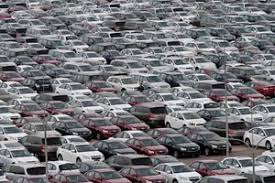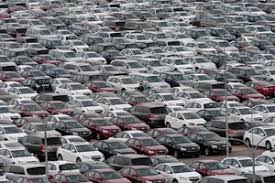
The market for used cars is very popular in Africa as it is one of the ore affordable ways of owning a car in the continent.
These used cars, primarily imported from countries like Japan or the Middle East, is however proving to be a hurdle for big carmakers and one that needs to be overcome if they intend to make it big in the African market.
While on one hand, the African market is throwing up opportunities for rapid growth as sales elsewhere is threatened by trade tensions, there is still need for the conventional engines in the market even as demand for such engines is on the downslide in the more traditional markets because of strict emission regulations.
Global car makers such as Volkswagen, BMW, Toyota, Nissan and others have reportedly got together to try and convince African governments to limit import of used cars which has made it difficult for these companies to set up indigenous production of cars in sub-Saharan Africa.
"The question on Africa isn't, 'Is it a market of the future?'" Mike Whitfield, Nissan's top executive for Africa, said in a a media interview. "It's a case of when."
The companies had formed the Association of African Automotive Manufacturers (AAAM) four years ago and its efforts are now apparently delivering results. According to media re[ports, government plans in Nigeria, Kenya and Ghana talks about duty exemptions and tax holidays of up to 10 years for auto companies that construct local assembly plants.
Compared to about 420,000 new cars in 2017, the anticipated number of sale of new cars can be 3 to 4 million annually in sub-Saharan Africa, said Thomas Schaefer, head of Volkswagen's Africa business.
However that would also mean that the car makers would have to quench the interests of the second-hand car dealers, smugglers and would require the lowering o new car prices to be attractive enough for customers to choose over used cars.
"It will largely depend on how successful the African governments are in limiting the amounts of second-hand imports and how price-competitive new vehicles can be with their tariffs," said Craig Parker, Africa research director at Frost & Sullivan, a U.S.-based market research firm.
There is a rapid increase in population and household incomes in Africa. However only about 1 per cent of the total sale of new cars globally is accounted for the 1 billion population, according to industry data. And about 85 per cent of that new car sale is accounted for only by South Africa.
Kenya, Nigeria and Ghana have been identified by AAAM as potential countries to set up manufacturing hubs. It has also helped in the draft making for legislation that sets the standards and incentives.
According to Jelani Aliyu, of Nigeria's National Automotive Design and Development Council, the rebates in taxes and other incentives of the auto industry is useful for the African region- currently faced with massive demographic pressures, as a whole because such legislation could create jobs. "The multiplying effects are exponential," said Aliyu.
(Source:www.economictime.indiatimes.com)
These used cars, primarily imported from countries like Japan or the Middle East, is however proving to be a hurdle for big carmakers and one that needs to be overcome if they intend to make it big in the African market.
While on one hand, the African market is throwing up opportunities for rapid growth as sales elsewhere is threatened by trade tensions, there is still need for the conventional engines in the market even as demand for such engines is on the downslide in the more traditional markets because of strict emission regulations.
Global car makers such as Volkswagen, BMW, Toyota, Nissan and others have reportedly got together to try and convince African governments to limit import of used cars which has made it difficult for these companies to set up indigenous production of cars in sub-Saharan Africa.
"The question on Africa isn't, 'Is it a market of the future?'" Mike Whitfield, Nissan's top executive for Africa, said in a a media interview. "It's a case of when."
The companies had formed the Association of African Automotive Manufacturers (AAAM) four years ago and its efforts are now apparently delivering results. According to media re[ports, government plans in Nigeria, Kenya and Ghana talks about duty exemptions and tax holidays of up to 10 years for auto companies that construct local assembly plants.
Compared to about 420,000 new cars in 2017, the anticipated number of sale of new cars can be 3 to 4 million annually in sub-Saharan Africa, said Thomas Schaefer, head of Volkswagen's Africa business.
However that would also mean that the car makers would have to quench the interests of the second-hand car dealers, smugglers and would require the lowering o new car prices to be attractive enough for customers to choose over used cars.
"It will largely depend on how successful the African governments are in limiting the amounts of second-hand imports and how price-competitive new vehicles can be with their tariffs," said Craig Parker, Africa research director at Frost & Sullivan, a U.S.-based market research firm.
There is a rapid increase in population and household incomes in Africa. However only about 1 per cent of the total sale of new cars globally is accounted for the 1 billion population, according to industry data. And about 85 per cent of that new car sale is accounted for only by South Africa.
Kenya, Nigeria and Ghana have been identified by AAAM as potential countries to set up manufacturing hubs. It has also helped in the draft making for legislation that sets the standards and incentives.
According to Jelani Aliyu, of Nigeria's National Automotive Design and Development Council, the rebates in taxes and other incentives of the auto industry is useful for the African region- currently faced with massive demographic pressures, as a whole because such legislation could create jobs. "The multiplying effects are exponential," said Aliyu.
(Source:www.economictime.indiatimes.com)





